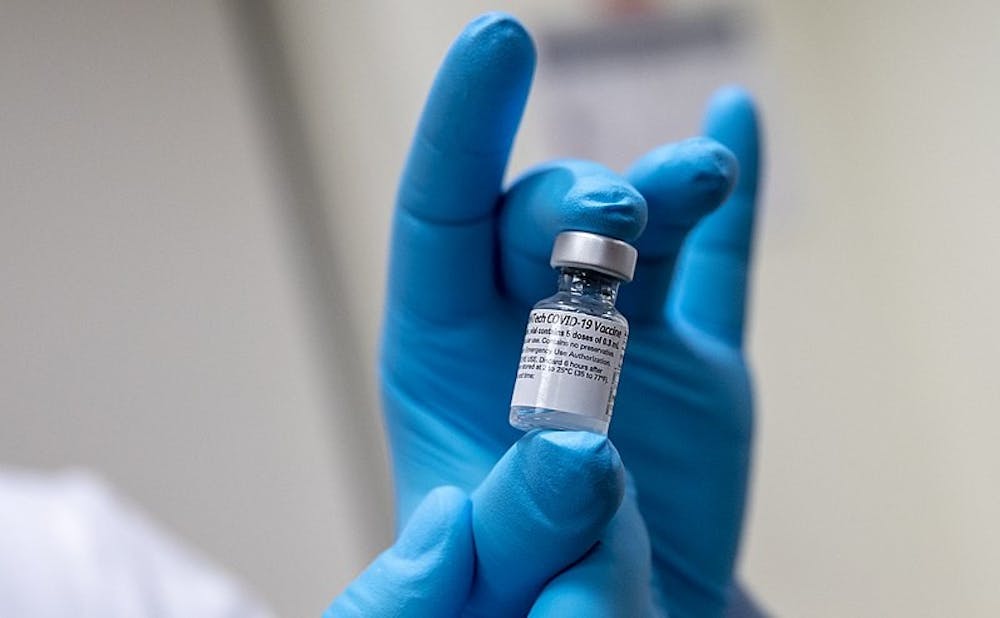In a recent column, Opinion Columnist Jessica Moore called upon people to be understanding of the well-founded fears that many people of color have when it comes to the coronavirus vaccine. As a Black person, I know this fear very well first-hand. In fact, in the beginning of lockdown in the country, I had a conversation with a family member in which we both said if a vaccine came out, “We ain’t getting it.” The legacy of racist medical malpractice such as the Tuskegee Study, the Henrietta Lacks case and many other cases of how Black people have been treated — and in many cases still are treated — has made us skeptical. Despite this, we know being vaccinated is a vital step in helping the country slow the spread and protect those around us.
It is imperative to note that vaccine hesitancy among Black Americans is not an anti-vaxxer stance. The root of many Black American’s mistrust is not because we don’t believe in vaccines. Simply put, a lot of us don’t trust a public health system that has in too many cases engaged in intentional harm to Black bodies when it comes to experimentation, neglect and so on. As of January, only a little over five percent of those who received a vaccine were Black, compared to 60 percent who were white. In addition to this, 35 percent of Black Americans have said they do not plan on receiving the vaccine. To fully understand our hesitancy, you must understand the history of racism in medicine.
You must consider cases like how doctors at Johns Hopkins University took cancer cells from a dying Black woman named Henrietta Lacks without her consent. They, along with other companies who profited, used those cells to create what would become a multimillion-dollar line of biological research. Moreover, for decades afterwards, they neglected to pass monetary compensation to Lacks’ descendants and continued to not ask for their consent in the handling of her case. They revealed Lacks’ name publicly, gave her medical records to the media and even published her cells’ genome online without consulting her family.
The most pertinent representation of racism in medicine is the Tuskegee syphilis study, which is also possibly one of the best-known cases of the government taking advantage of the Black body. The U.S. Public Health Service sponsored an experiment from 1932 to 1972, where hundreds of Black men with syphilis were given placebos instead of actual medicine or effective care so that doctors could document the long-term progression of the disease. Many of the men died or developed other serious health issues even though they were promised proper treatment in participating in the study.
The men were lured into the experiment under abhorrent false pretenses, while the real purpose of the study was to learn whether untreated syphilis progressed differently in Black people compared with white people. This idea — suggesting Black people are less than human and inferior compared to whites — has deep ties with racial maltreatment in medicine today. It is the root of why Black people are often given different treatment based on the way they are perceived — whether it be a higher pain tolerance or assumed tendency to exaggerate. These issues alone are evidence enough as to why the Black community’s hesitantancy is valid when it comes to receiving the COVID-19 vaccine.
There are other factors that play into our hesitancy as well. When you add in concerns of future issues or allergic reactions, along with misinformation, it is imperative that we do our due diligence to remain accurately informed in order to make the best decision for ourselves. Among this, many Black Americans who do plan to get the vaccine are just waiting to see how well it is working in and affecting other people before they get it themselves. Even with these concerns, it remains that our skepticism goes deeper than any level of misinformation or lack of proper information. On top of the Tuskegee study and Henrietta Lacks cases, we have seen the Black maternal mortality rate, the stories of medical neglect in this pandemic and the practice of eugenics — a history that our University is not immune to. The combination of racism in medicine, misinformation and health concerns are what make up our hesitancy.
There are many cases of racially charged medical malpractice throughout history and in the present — especially since the beginning of the COVID-19 pandemic. It is not hard to see and understand why many Black Americans are hesitant to receive a vaccine due to this mistrust that has built up over the long history of racism in medicine. While our hesitancy is valid — and should provoke the U.S. healthcare system to address its history of medical racism — we also have to recognize that this vaccine is an opportunity to protect ourselves and others from a virus that has set many of our lives off track. We have certainly felt the effect of the pandemic, considering Black people have the second highest number of recorded coronavirus deaths. The vaccine has gone through many clinical trials and has been deemed safe for the general public. As a student currently on Grounds, it seems my time to be vaccinated will not come for a little while, but when it does, I will be more than ready to do my part.
Aliyah D. White is an Opinion Columnist for The Cavalier Daily. She can be reached at opinion@cavalierdaily.com.
The opinions expressed in this column are not necessarily those of The Cavalier Daily. Columns represent the views of the authors alone.







